Meet the JD Class of 2024
The 282 students in Duke Law School’s JD class of 2024 come from 37 different U.S. states and territories and from six other countries and represent 127 different undergraduate institutions.
For Sam Lawrence, the path to law school started at the juvenile public defender’s office in New Orleans, where he had his first exposure to the connection between childhood trauma and court involvement.
As a youth advocate with the Louisiana Center for Children’s Rights, his job was to help lawyers represent children in court but also to address the root causes of instability in their lives, such as mental health issues, poverty, academic challenges, and institutional racism. Their efforts often led to clients returning to school, getting treatment, finding jobs, and avoiding incarceration.
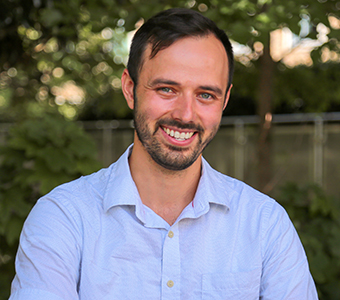
Lawrence went on to earn a Master’s of Social Work at the University of North Carolina-Chapel Hill and received specialized training in the treatment of childhood PTSD as a clinical intern at the Duke Center for Child and Family Health. Lawrence subsequently worked for four years as an intensive in-home therapist for children at risk of placement in group homes, psychiatric facilities, and juvenile detention. Now, he hopes to bridge social work and law and one day replicate in Durham the holistic model of public defense that he first saw in New Orleans.
“As much as I loved the work I was doing as a therapist, I was most exhilarated when I had an opportunity to advocate for my clients in court,” says Lawrence, a first-year student who began his studies in August. “I think every child in court deserves not only a lawyer but an interdisciplinary defense team that can better understand the full breadth of their experience and fight for them in and out of the courtroom.”
Lawrence is one of 282 students in Duke Law School’s JD class of 2024. They come from 37 different U.S. states and territories and from six other countries and represent 127 different undergraduate institutions. Many earned graduate degrees, including master’s in economics, biology, political science, finance, clinical psychology, international relations, art business, education, public health, public policy, fine arts, and, like Lawrence, social work. Women make up 55% of the class, and 37% are students of color, including the Law School’s largest-ever cohorts of Latinx and Asian American students.
Lawrence has lived in the Triangle for six years and says he feels a special bond with Durham, but it was the guidance and support for students’ “bold ideas” that cemented his choice of Duke Law. He was particularly impressed by the Eviction Diversion Program, started in 2017 by students and faculty in the Civil Justice Clinic in partnership with Legal Aid of North Carolina, as well as the recent spring break trips students have organized to assist migrants at the U.S.-Mexico border with asylum applications. He envisions developing his idea of creating a holistic juvenile public defender’s office in Durham as a second- and third-year student.
“I wanted to be at a school that empowers students to make their big ideas happen,” he says. “I came to law school to continue directly representing individuals, but also to be part of a movement and profession that would allow me to have a broader structural impact.”
Analese Bridges had known since her childhood in central Georgia that she wanted to attend law school. But an internship in her local district attorney’s office during high school confirmed it as she heard lawyers struggling with questions at the intersection of law and technological innovation.
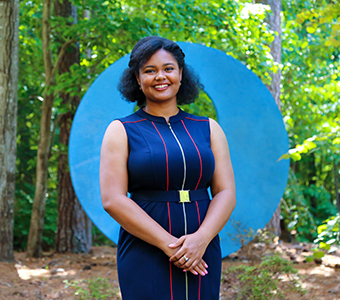
“‘Can we use a Snapchat as evidence? How do we deal with things like cyberstalking and cyberbullying? This judge doesn't even know what these technologies are ... how do we explain it to them?’” Bridges recalls the attorneys in her office asking. “I wanted to understand these questions and how technology is shaping our legal system and the legal practice.”
Bridges began trying to answer them as an undergraduate at Duke, where she majored in political science, earned certificates in Ethics & Society and Information Science + Studies, and worked as a research assistant at the Kenan Institute for Ethics. As a senior, she wrote a thesis focused on the intersection of intimate partner surveillance and spyware, and she and a group of fellow undergraduates created a startup company that later won grants from Microsoft, the Amazon Web Services Startup accelerator, and the National Science Foundation for its work on using machine learning to make coding education more accessible.
Bridges also worked with Law School students and faculty as a member of a Bass Connections team led by Professor of the Practice Sarah Bloom Raskin and Lee Reiners, executive director of the Law School’s Global Financial Markets Center. The team researched the harm done by consumer data breaches, such as the one that hit Equifax in 2017, and collaborated on a 10-step guide to cybersecurity that achieved wide distribution. After graduation, as a structured finance legal analyst at Goldman Sachs, she and a team of co-workers competed in the firm’s global analyst pitch competition, winning funds to support the Black Women’s Health Imperative, a non-profit focused on improving the health and wellness of Black women and girls in the United States.
Bridges says she chose Duke for law school for the same reasons she picked it for college: the accessibility and mentorship of professors and the opportunity for experiential as well as academic learning. Even during the process of deciding on a law school, she was impressed by the sense of community and collaboration and the willingness of people she met to connect her with others who shared her interests.
“I noticed that trait in everyone I talked to and was like, ‘Okay, this is truly a collegial environment and I want to be a part of it,’” she says.
Looking back on her childhood, Cecilia Cardelle believes her parents shielded her from bias and discrimination when they moved their Cuban American family from Miami to rural Salisbury, N.C. But as a high school senior, she and her sister received national media attention for protesting at a local rally for then-presidential candidate Donald Trump, and the backlash from her neighbors gave her a new outlook on her identity and her future.
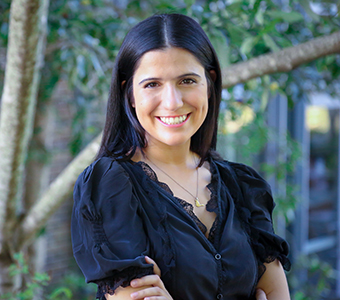
“It made me think about the privilege that I had exercised my entire life by being white-passing and having certain [advantages], all of these things that really cultivated a blissful ignorance towards the racial tensions in my community,” Cardelle says. “And it was at that moment when I started reflecting upon what I wanted to do with my life and how empowered I felt speaking up on behalf of [others]. And that's when I started considering law as a profession.”
Cardelle combined her new interest in the law with a growing connection to her Latinx identity as an undergraduate at Duke. She majored in philosophy and earned certificates in Human Rights and Latino Studies of the Global South, and was involved in the Latin American affinity group Mi Gente and Gente Aprendiendo Para Nuevas Oportunidades, a student club that offers ESL tutoring to Spanish-speaking residents of Durham. Being part of a cultural community helped her feel seen and heard at the university, and she believes that will continue to be true in law school and beyond.
“Going into a profession where I will be a minority, I think that it will be really crucial for me to be around people who share the same struggles, background, cultures, language,” she says. “I think all of that is very important for just feeling as though you're understood and feeling as though you belong in a predominantly white space.”
Cardelle spent her senior year at Duke taking classes online and living with fellow students in the Washington Duke Inn, graduating in May. When it came time to pick her next stop, there wasn’t much doubt she would choose the place where she had already built a community.
“A big part of why I chose to come to Duke for law school is the Durham community being so diverse and rich in culture,” she says. “That really influenced me to stay here in this place that I cherish and love.”
She doesn’t claim to be an influencer, but Mina Li arrived at Duke having spent three years working on one of the world’s hottest social media platforms.
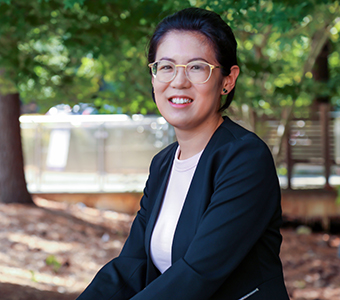
In 2018 Li joined Chinese Internet company ByteDance shortly after it launched TikTok, an app for sharing short videos. The new platform became a sensation as users uploaded videos of themselves lip-syncing or dancing that went viral, and celebrities and brands were soon drawn by its burgeoning audience. By 2020 TikTok had become the most downloaded app of the year and ByteDance was the world’s most valuable privately-owned startup company.
Li, who majored in English Literature as an undergraduate at Peking University, was hired as a project manager on TikTok’s music licensing team. The nascent team’s job: negotiating with record labels, publishers, and performance rights organizations for rights to the sounds that are the lifeblood of user videos. As the platform took off and spread to more countries, Li’s team of four grew to more than 70 people, she relocated to New York from Beijing, and the whirlwind experience inspired her to consider expanding her knowledge and skills in intellectual property by going to law school.
“I was working with a lot of copyright lawyers and IP lawyers,” she says. “They were really supportive of my interests in IP and they also gave me a lot of exposure. I was going through music licensing agreements, figuring out the types of rights that we were granted, the scope of rights, territory, and different types of usage, which was just really fascinating to me.”
At Duke, Li is enrolled in the JD/LLM in Law and Entrepreneurship dual-degree program, drawn by its reputation for preparing students to advise startup companies as well as its unique summer immersion experience. She hopes to return to working in technology and entertainment after graduation, perhaps in the interactive media industry, and has her sights on working in Austin, Texas, one of the industry’s hubs.
“I really like how the work is fast-paced and is challenging, but people are just extremely supportive, and it was a very collegial environment,” she says. “It was really good for my growth, so I definitely want to go back.”
As the rare Durham native at Duke, Shirley Garrett has found herself fielding questions from classmates about the best places to go for fun, but she is serious about her roots in the Bull City. A longtime community volunteer and leader, Garrett points to her experience with two local organizations as helping confirm her long-held interest in the law.
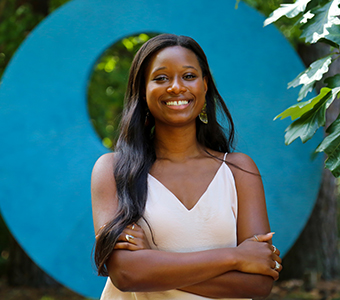
After her freshman year in high school, she began working at a summer camp program operated by Reality Ministries, a faith-based Durham nonprofit that serves about 300 people with developmental disabilities with a mission to build friendships and community between people of diverse abilities. She continued to volunteer for the group while studying political science and international relations at High Point University, and she soon recognized that she had developed a passion for disability advocacy. In August 2020, she began a year-long fellowship with the group, providing pastoral care, running social programming, and leading karaoke and yoga groups.
“I realized how those friendships had changed me and helped me see my friends with disabilities outside of the context of their disabilities,” she says. “[I also recognized] the ways that other people hadn't come to that realization in their life. People with disabilities are so important. They are a part of our society and need to be seen.”
Garrett says she feels called to disability law, but it’s not the only passion she has pursued that ultimately led her to law school. After college, as an elections intern at the Democracy Fund, she researched and wrote grants to grassroots organizations working on voter protection reforms. The position built on years of advocacy and education for youth engagement in elections through Kids Voting Durham, a civic engagement and leadership development program for K-12 students that she began working with in 9th grade and now chairs. And as she notes, election law can intersect with disability law when people with disabilities face disenfranchisement, such as when voting sites aren’t wheelchair-accessible.
In her spare time, Garrett enjoys being with her parents and sister, tending to a houseplant collection that burgeoned during the pandemic, and helping out on Reality Ministries’ farm off Erwin Road.
And her favorite recommendation for Durham newbies? Head to Sennett’s Hole on the Eno River, also known as “Turtle Hole.” “It’s so beautiful at sunset,” she says, “so that’s always my piece of advice.”